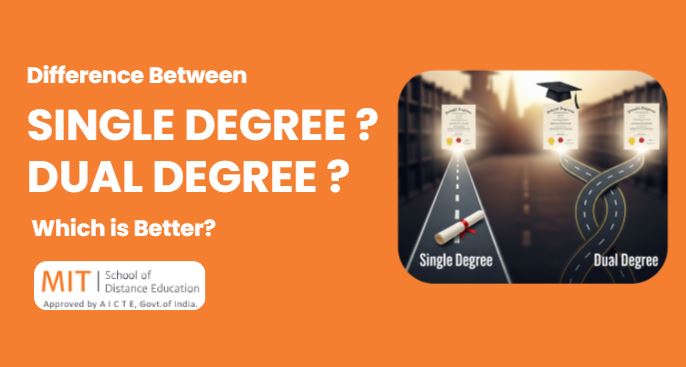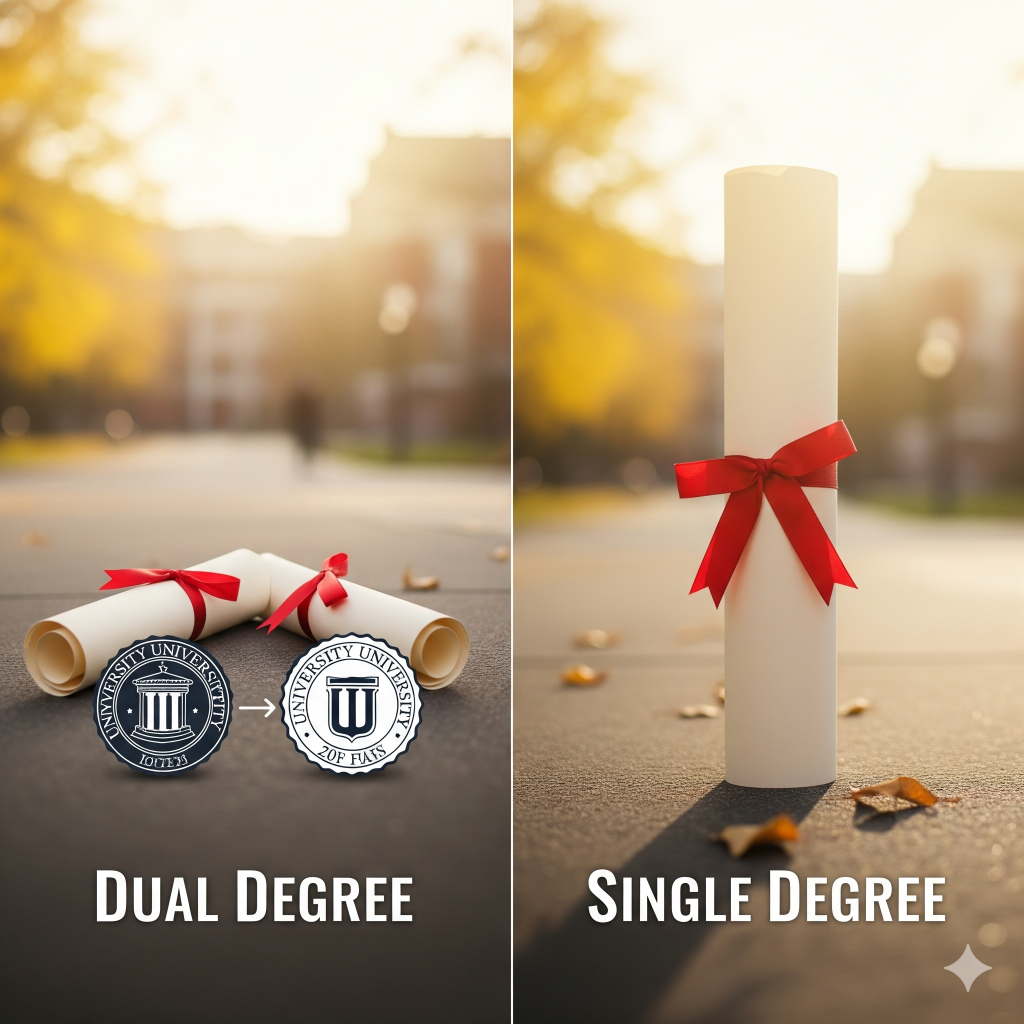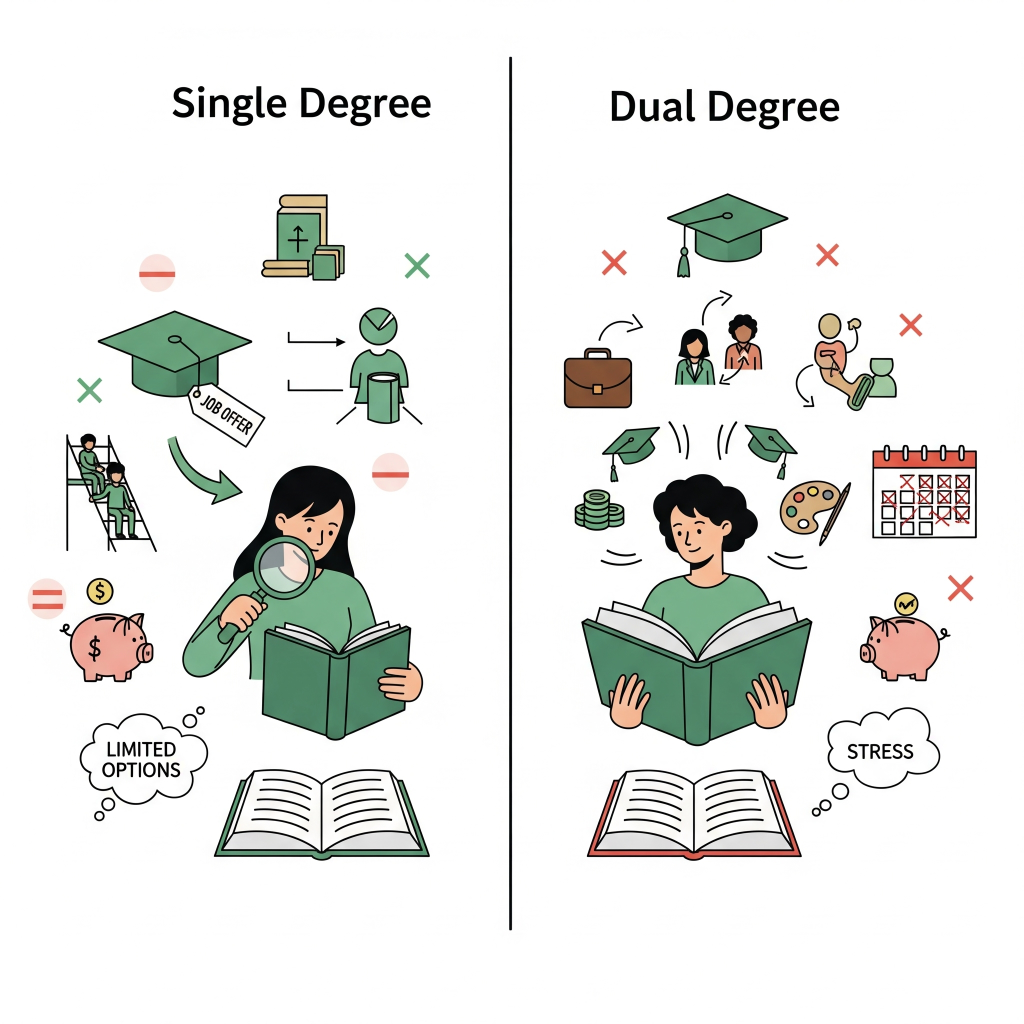
Introduction
In today’s competitive world, education has evolved beyond traditional boundaries. Students and working professionals are no longer limited to choosing just one program; instead, they now have the option to pursue dual degree programs alongside single degree programs. With industries demanding multi-skilled professionals, dual degrees are becoming increasingly popular, especially in management and technical fields.
But that leads to a crucial question: Should you choose a single degree or go for a dual degree program? The answer depends on your career goals, financial capacity, and long-term vision. In this blog, we’ll break down the difference between dual degree and single degree, explore their pros and cons, and help you decide which option is the right fit for you.
What is a Single Degree?
A single degree is the traditional form of higher education where students focus on one program at a time. It provides specialized knowledge in a particular field and is best suited for individuals who want a clear, focused career path.
- Definition & Structure: One program, one specialization, and a straightforward curriculum.
- Duration & Focus: Typically takes 1–2 years for postgraduate programs like Executive PGDM or Executive MBA (EMBA).
- Example Programs: Executive PGDM, EMBA, MBA, PGDM.
- Advantages: Offers in-depth expertise, requires less time and money, and allows for faster career advancement.
For example, an Executive PGDM provides working professionals with advanced management skills to climb the corporate ladder, while an Executive MBA focuses on leadership and strategic decision-making.
What is a Dual Degree?
A dual degree program allows students to earn two qualifications simultaneously. It is designed for those who want to gain knowledge in multiple domains, often combining complementary fields to expand career opportunities.
- Definition & Structure: Two academic programs integrated into one course of study.
- How It Works: For example, an Executive MBA + Executive PGDM equips professionals with leadership skills and a strong management foundation, making them highly versatile.
- Duration & Workload: Usually longer and more intensive than single degrees.
- Advantages: Provides wider expertise, builds interdisciplinary knowledge, and enhances career flexibility.
Dual degrees are particularly useful for professionals targeting global opportunities, leadership roles, or entrepreneurship, where multi-disciplinary skills are highly valued.

Key Differences Between Dual Degree and Single Degree
Here’s a detailed comparison to help you understand the difference:
Duration:
- Single Degree: Shorter (1–2 years for postgraduate programs).
- Dual Degree: Longer (2–3 years or more, depending on the combination).
Cost:
- Single Degree: More affordable.
- Dual Degree: Higher investment due to additional coursework and resources.
Curriculum:
- Single Degree: Focused on one specialization (e.g., finance, HR, or marketing).
- Dual Degree: Multidisciplinary and covers two areas of study.
Workload:
- Single Degree: Balanced and manageable.
- Dual Degree: Intensive, requiring strong time management.
Career Opportunities:
- Single Degree: Opens roles in one specific field.
- Dual Degree: Offers flexibility across industries and leadership positions.

Pros and Cons of a Dual Degree
Pros:
- Provides exposure to multiple fields.
- Enhances employability and versatility.
- Competitive advantage in global markets.
- Potential for higher salary packages.
- Ideal for leadership, entrepreneurship, and international careers.
Cons:
- Higher tuition and other costs.
- Intensive workload requiring strong commitment.
- Longer time frame before entering or advancing in the workforce.

Which One is Better?
The big question: Is a dual degree better than a single degree? The answer is not one-size-fits-all. It depends on your career aspirations, financial situation, and long-term goals.
Choose a Single Degree if:
- You want to specialize in one field.
- You are working with a limited budget.
- You need to finish your education quickly to re-enter the workforce.
- You prefer focused and less stressful academic commitments.
Choose a Dual Degree if:
- You aspire to leadership or global roles.
- You want to broaden your knowledge across multiple disciplines.
- You can invest more time and money for long-term career gains.
- You want to stand out in a competitive job market.
In short: Single degree = depth. Dual degree = depth + breadth.
8. Real-World Examples & Case Studies
To better understand, let’s look at two scenarios:
Case 1: Single Degree Holder (Executive MBA)
Ravi, a mid-level manager, completed his EMBA in 1.5 years. He quickly secured a senior management role because of his strong leadership training. His career path is clear and focused on management roles.
Case 2: Dual Degree Holder (Executive MBA + Executive PGDM)
Priya opted for a dual degree. Though it took her longer to complete, she gained expertise in both leadership and strategic management. Today, she works with an international consulting firm and has the flexibility to shift between industries.
Industry Preferences:
- Tech and startups often prefer dual degree holders due to their versatility.
- Traditional industries value single degree holders with deep specialization.
Top Benefits of Pursuing a Dual Degree
1. Earn Two Degrees Simultaneously:
Dual degree programs allow you to gain two recognized qualifications at the same time, such as an MBA + PGDM. This gives you more credentials in less time, making you stand out to employers.
2. Time and Cost Savings:
Instead of completing two degrees separately, a dual degree combines them into a shorter duration, saving both tuition costs and living expenses.
3. Wider Career Opportunities:
With qualifications in two disciplines, you can explore multiple career paths across different industries, such as management, technology, or business analytics.
4. Enhanced Skill Set – Multidisciplinary Learning:
Dual degree programs provide diverse skills, combining technical, managerial, and professional knowledge, preparing you for complex real-world challenges.
Top Benefits of Pursuing a Single Degree
1. Focused Learning:
A single degree lets you specialize deeply in one subject, helping you become an expert in your chosen field.
2. Lower Cost and Workload:
Single degrees usually have less academic pressure and are more affordable, making them suitable for students who prefer a focused approach.
3. Clear Career Path:
Single degree programs provide a well-defined career trajectory, allowing you to gain expertise and credibility in one domain.
4. Flexibility for Higher Studies:
After completing a single degree, you have freedom to pursue advanced programs like MBA, PGDM, or certifications at your own pace.
Conclusion
Both single degree and dual degree programs have unique advantages and drawbacks. If you’re looking for quick, affordable, and focused education, a single degree is the right choice. But if your goal is to expand career opportunities, gain multidisciplinary knowledge, and aim for leadership roles, then a dual degree program is worth the investment.
The key is to align your decision with your career goals, time availability, and financial capacity. Ultimately, the “better” choice depends on your personal aspirations and where you see yourself in the future.



